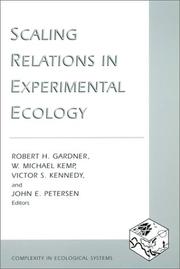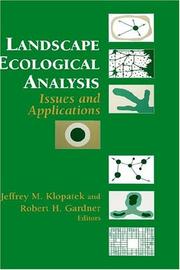| Listing 1 - 10 of 14 | << page >> |
Sort by
|

ISBN: 0231114982 0231114990 Year: 2001 Publisher: New York (N.Y.) : Columbia university press,
Abstract | Keywords | Export | Availability | Bookmark
 Loading...
Loading...Choose an application
- Reference Manager
- EndNote
- RefWorks (Direct export to RefWorks)
Ecology --- Methodology.
Book
ISBN: 1493927930 1493927949 Year: 2015 Publisher: New York, NY : Springer New York : Imprint: Springer,
Abstract | Keywords | Export | Availability | Bookmark
 Loading...
Loading...Choose an application
- Reference Manager
- EndNote
- RefWorks (Direct export to RefWorks)
This work provides in-depth analysis of the origins of landscape ecology and its close alignment with the understanding of scale, the causes of landscape pattern, and the interactions of spatial pattern with a variety of ecological processes. The text covers the quantitative approaches that are applied widely in landscape studies, with emphasis on their appropriate use and interpretation. The field of landscape ecology has grown rapidly during this period, its concepts and methods have matured, and the published literature has increased exponentially. Landscape research has enhanced understanding of the causes and consequences of spatial heterogeneity and how these vary with scale, and they have influenced the management of natural and human-dominated landscapes. Landscape ecology is now considered mainstream, and the approaches are widely used in many branches of ecology and are applied not only in terrestrial settings but also in aquatic and marine systems. In response to these rapid developments, an updated edition of Landscape Ecology in Theory and Practice provides a synthetic overview of landscape ecology, including its development, the methods and techniques that are employed, the major questions addressed, and the insights that have been gained.”.
Ecology --- Earth & Environmental Sciences --- Life sciences. --- Regional planning. --- Urban planning. --- Ecosystems. --- Landscape ecology. --- Ecology. --- Environmental management. --- Life Sciences. --- Landscape Ecology. --- Landscape/Regional and Urban Planning. --- Environmental Management. --- Terrestial Ecology. --- Theoretical Ecology/Statistics. --- Endangered ecosystems. --- Threatened ecosystems --- Biotic communities --- Nature conservation --- Environmental stewardship --- Stewardship, Environmental --- Environmental sciences --- Management --- Balance of nature --- Biology --- Bionomics --- Ecological processes --- Ecological science --- Ecological sciences --- Environment --- Environmental biology --- Oecology --- Population biology --- Regional development --- Regional planning --- State planning --- Human settlements --- Land use --- Planning --- City planning --- Landscape protection --- Government policy --- Ecology . --- Cities and towns --- Civic planning --- Land use, Urban --- Model cities --- Redevelopment, Urban --- Slum clearance --- Town planning --- Urban design --- Urban development --- Urban planning --- Art, Municipal --- Civic improvement --- Urban policy --- Urban renewal --- Biocenoses --- Biocoenoses --- Biogeoecology --- Biological communities --- Biomes --- Biotic community ecology --- Communities, Biotic --- Community ecology, Biotic --- Ecological communities --- Ecosystems --- Natural communities --- Biotic communities. --- City planning.

ISBN: 0387983252 Year: 1999 Publisher: New York (N.Y.) : Springer,
Abstract | Keywords | Export | Availability | Bookmark
 Loading...
Loading...Choose an application
- Reference Manager
- EndNote
- RefWorks (Direct export to RefWorks)
Studies in landscape ecology focus on the effect of heterogeneity on ecosystem structure and function. Vigorous growth in the field has included the development of methods and results that can be applied to an impressive range of environmental issues. The purpose of this book is to provide the reader with a current perspective on this rapidly developing science. This book features contributions by internationally renowned experts in the field that address a broad spectrum of political, theoretical and applied aspects of the subject. Chapters describe a number of methods and models that are used at landscape and regional scales within the context of ecosystem management, to assess changes in biodiversity, and to evaluate sustainable landscape planning for cultural as well as natural settings. Also included are instructional models to assist in teaching.
Geografie --- Landscape ecology. --- Landschapskunde --- Ecologie.
Digital
ISBN: 9781493927944 9781493927937 9781493927951 9781493938186 Year: 2015 Publisher: New York, NY Springer
Abstract | Keywords | Export | Availability | Bookmark
 Loading...
Loading...Choose an application
- Reference Manager
- EndNote
- RefWorks (Direct export to RefWorks)
This work provides in-depth analysis of the origins of landscape ecology and its close alignment with the understanding of scale, the causes of landscape pattern, and the interactions of spatial pattern with a variety of ecological processes. The text covers the quantitative approaches that are applied widely in landscape studies, with emphasis on their appropriate use and interpretation. The field of landscape ecology has grown rapidly during this period, its concepts and methods have matured, and the published literature has increased exponentially. Landscape research has enhanced understanding of the causes and consequences of spatial heterogeneity and how these vary with scale, and they have influenced the management of natural and human-dominated landscapes. Landscape ecology is now considered mainstream, and the approaches are widely used in many branches of ecology and are applied not only in terrestrial settings but also in aquatic and marine systems. In response to these rapid developments, an updated edition of Landscape Ecology in Theory and Practice provides a synthetic overview of landscape ecology, including its development, the methods and techniques that are employed, the major questions addressed, and the insights that have been gained.”.
Nature protection --- Biomathematics. Biometry. Biostatistics --- General ecology and biosociology --- Environmental protection. Environmental technology --- Pedology --- Environmental planning --- Economic geography --- landschapsecologie --- ruimtelijke ordening --- statistiek --- ecologie --- milieubeleid --- geografie --- ecosystemen
Book
ISBN: 9781461268048 Year: 1999 Publisher: New-York : Springer,
Abstract | Keywords | Export | Availability | Bookmark
 Loading...
Loading...Choose an application
- Reference Manager
- EndNote
- RefWorks (Direct export to RefWorks)
Landscaping --- environment --- ecology --- Data analysis --- ecosystems --- Natural resources management --- Landscape conservation --- Simulation models --- Environmental modelling --- Statistical methods --- Biodiversity
Book
ISBN: 0873711637 Year: 1992 Publisher: Chelsea (Mich.) : Lewis,
Abstract | Keywords | Export | Availability | Bookmark
 Loading...
Loading...Choose an application
- Reference Manager
- EndNote
- RefWorks (Direct export to RefWorks)
Article
Abstract | Keywords | Export | Availability | Bookmark
 Loading...
Loading...Choose an application
- Reference Manager
- EndNote
- RefWorks (Direct export to RefWorks)
Article
Abstract | Keywords | Export | Availability | Bookmark
 Loading...
Loading...Choose an application
- Reference Manager
- EndNote
- RefWorks (Direct export to RefWorks)
Book
Year: 1985 Publisher: Washington, DC: US department of energy,
Abstract | Keywords | Export | Availability | Bookmark
 Loading...
Loading...Choose an application
- Reference Manager
- EndNote
- RefWorks (Direct export to RefWorks)
Book
Year: 1986 Publisher: Washington, DC: US department of energy,
Abstract | Keywords | Export | Availability | Bookmark
 Loading...
Loading...Choose an application
- Reference Manager
- EndNote
- RefWorks (Direct export to RefWorks)
| Listing 1 - 10 of 14 | << page >> |
Sort by
|

 Search
Search Feedback
Feedback About UniCat
About UniCat  Help
Help News
News